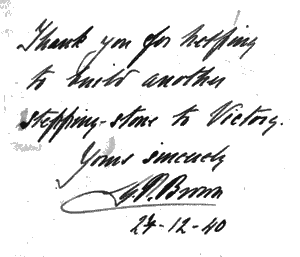«Brown Studies» — Poems by G. P. Brown, Punta Arenas, Chile, 1940
Site
Home BackgroundThe Book
Publisher's Acknowledgment Author's ForewordContents
Could I forget? The Cross What Profit a Man? May 1940 June 1940 Hyde Park Orators Are You Doing Your Bit? Home The Haven of Love Afterglow The Six Dolls Forget-me-not My Little Ship Mother's Day The Easy Way Mother Flea The Stockings' Lament The Gamble Who Was It? A Mother's Right Teach me to be HumbleContact
Duncan Campbell---
B A C K G R O U N D
This collection of poetry was published early in the Second World War by The British Patriotic Committee, Punta Arenas, Chile. The author stated that this is «… the only volume of my Poems issued with my approval. […] All profits arising from the sale of this book were devoted to the Funds being raised here for British Patriotic purposes. ». Inside the cover is the following hand-written message:

We have been able to assemble a few facts concerning Mr. George Charles Percival Brown. In his business life, he was an import agent. An active member of the British expatriate community in Punta Arenas, he served as music director for the Magellan Dramatic Society (an amateur group). His fellow countryman Tom P. Jones remembered that during World War II, «... he lent his office premises for the purpose of selling farm produce sent in by British people in the Camp». It is also reported that he assisted the Chilean Red Cross. At the end of the War, he was awarded the M.B.E. (Member of the Order of the British Empire) by the British government.
These poems touch on a range of themes: family, love and friendship, social inequalities and total war - sometimes humorous, never sarcastic. The person who emerges is one who is unashamedly sentimental - a believer in the goodness of others and the importance of a positive attitude to life. He deplores the waste and destruction of warfare; at the same time, quietly encouraging his fellow-countrymen to stand up for their homeland in its dark hour.
The style of writing is simple: rhyming verses, usually well scanned. At times, there are hints of other well-known poems and set phrases. These are period pieces, as out-of-fashion today as the schmaltzy sentiments they express; but there is a dignity that raises them above the merely tawdry.
Our thanks to Helena Mackay for sharing this work with us, and for transcribing the text.
Duncan S. Campbell
rev. June 2011